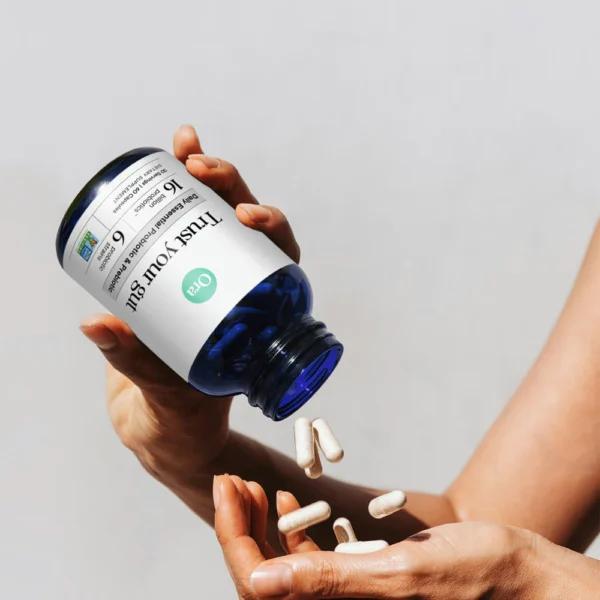In Partnership With Ora
Despite the growing body of research highlighting the wide-ranging benefits of probiotics—from supporting digestion to boosting immunity and even improving mood—many people still don’t experience the results they expect from the supplements they’re taking. You might be diligently taking your daily probiotic, yet feeling no noticeable change.
The reality is, not all probiotics are created equal. The effectiveness of a probiotic depends on several factors, including the specific strains used, the prebiotic content, and how well the probiotics are formulated to survive your stomach’s harsh environment. If you’re not seeing the benefits, there could be a few reasons why—and here’s what you can do about it.
1. You’re Taking the Wrong Strains
Probiotics aren’t a one-size-fits-all solution. The specific strains in a supplement determine its efficacy for different health concerns. Some probiotics are better for digestion, others for immune support, and some may even help with conditions like irritable bowel syndrome (IBS).It’s crucial to select a probiotic that lists the strain numbers on the supplement facts, giving you the power to look up clinical studies on each strain. Here are a few key strains widely clinically studied to look for:
- Lactobacillus acidophilus DDS-1: This strain has been studied extensively for improving digestion, reducing symptoms of lactose intolerance, and alleviating IBS-related discomfort.
- Bifidobacterium longum UABI-14: Known for its immune system support, this strain has also shown promise in managing ulcerative colitis.
- Lactobacillus reuteri UALre-16: This acid-resistant strain not only survives stomach acid but also helps produce beneficial organic acids and may assist in synthesizing vitamins like B12 and folate in the body.
2. Probiotic Count Isn’t Guaranteed Until the End of Shelf Life
Many probiotic brands tout high colony-forming units (CFU) counts on their labels, but those numbers are often reflective of the product at the time of manufacture—not when you take them. By the time the supplement reaches your digestive system, many of the probiotics could already be dead.Make sure you select a probiotic that guarantees the CFUs per dose until the end of shelf life, not just at the time of manufacture. This means you’re getting the live probiotics you paid for, even months after purchase.
3. They’re Getting Killed by Stomach Acid
One of the biggest reasons probiotics fail is that they don’t survive the journey through the stomach. The stomach is highly acidic and designed to break down harmful bacteria, but this can also destroy the probiotics before they reach the intestines, where they can start to work.4. Not Enough Prebiotics to Feed the Probiotics
Probiotics need fuel to thrive once they reach your gut, and that’s where prebiotics come in. Prebiotics are fibers that feed the good bacteria in your gut, helping them grow and multiply. Without enough prebiotics, your probiotics are less effective because they don’t have the nutrients they need to establish themselves.5. Lack of Transparency
It’s hard to trust a product if you don’t know exactly what’s in it. Unfortunately, many probiotic brands aren’t transparent about their ingredients or their testing process. They might not provide third-party testing, meaning you’re left wondering if the product is safe and effective.Ora–A Tested and Proven Brand You Can Trust
If your current probiotic isn’t delivering results, it might be due to a lack of clinically proven strains, an insufficient number of live organisms, or poor survival through the digestive tract. It could also be that your probiotics aren’t getting the prebiotic content they need to thrive, or perhaps the brand lacks transparency about what’s really in the product.Switching to a high-quality probiotic like Ora’s Trust Your Gut Probiotic & Prebiotic, can make all the difference. Here’s why Ora stands out as an exceptional choice:
- Ora lists strain numbers for each probiotic, allowing customers to look up clinical studies on the exact strains they’re consuming.
- Unlike most brands, Ora guarantees the probiotic count until the end of shelf life, so consumers can be confident they’re receiving at least the amount of live organisms claimed on the label, even months after purchase.
- Ora only uses clinically proven acid-resistant strains, ensuring they survive the stomach’s harsh environment and reach the gut intact. This is critical for ensuring the probiotics can do their job in balancing your gut microbiome. Plus, with Ora’s probiotics, there’s no need for refrigeration—another convenience that sets it apart from other brands.
- Ora’s probiotics provide 4–6 times more organic prebiotics than most leading probiotic brands. What sets Ora apart further is the inclusion of one of the most potent prebiotics—organic inulin from Jerusalem artichoke. This substantial dose ensures that the beneficial bacteria in your gut are well-nourished, allowing them to thrive and deliver the maximum health benefits from your probiotic supplement.
- All Ora products undergo rigorous third-party testing for heavy metals, pathogens, and allergens, with all results published on their website. This commitment to transparency gives consumers confidence in exactly what they’re putting into their bodies.

Probiotics are a crucial part of your gut and overall health, but quality matters. If yours isn’t working, it’s time to upgrade to one that does.
Take advantage of a unique opportunity to get your first Ora probiotics at a 30 percent discount! Check out the limited offer HERE!







